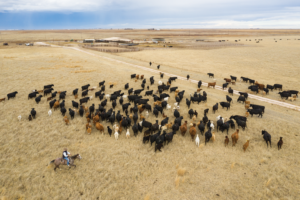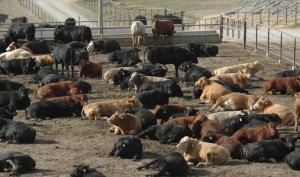When my wife and I moved to the Texas Panhandle in early 1995, we thought we were relocating to a place where the “smell of money” had a more, um, organic origin … that it wouldn’t be harmful to the health of those closest to it.
We had lived for nearly 11 years in the Golden Triangle, the heart of the Texas petrochemical and oil refining industry, where the smell of money was full of cancer-causing agents.
It now turns out, according to the Texas Observer, that the Panhandle’s money smell is, shall we say, not so healthy after all.
It’s called “fecal dust,” with the incessant wind blowing clouds of dirt filled with cattle dung particles. The result has been increases in respiratory illness, extreme discomfort and a smell that forces feedlot employees to shed their clothing the minute they go home after working among thousands of head of cattle.
The Panhandle produces roughly one-fifth of the beef consumed in the United States. The beef, as we know, comes from cattle that are sent to feedlots to fatten up prior to the beasts being “processed” into the meat we enjoy at our dinner tables.
It’s what they do in those feedlots that is the center of the Observer’s investigation. There’s no nice way to say it: They crap on the ground inside the pens; the wind blows the dirt across the sprawling, open landscape. Those who are near the source suffer from assorted respiratory ailments.
As the Observer reported: “You go outside and it’ll just burn your nose and your eyes,” (Lawrence) Brorman says. The dust brings foul odors so pervasive that they can penetrate the Brormans’ farmhouse even when the doors and windows are closed. Lawrence and his wife, Jaime, use a more explicit term for the fecal dust: “shust,” a portmanteau of “shit” and “dust.” (Other folks who live here are partial to “shog,” a mashup of the same first word and “fog.”)
Read the Observer story here.
This story alarms me. It concerns me because I have friends who live near those feedlots. My wife and I have dear friends who live in Hereford, which is the undisputed, if unofficial, “capital” of the cattle-feeding industry in the Texas Panhandle.
There needs to be a careful monitoring of that fecal dust matter, for sure. Let us hope Texas environmental regulators are keeping an eye — and a nose — open to what’s transpiring up yonder on the Caprock.
Indeed, “organic” doesn’t always mean “healthy.”

